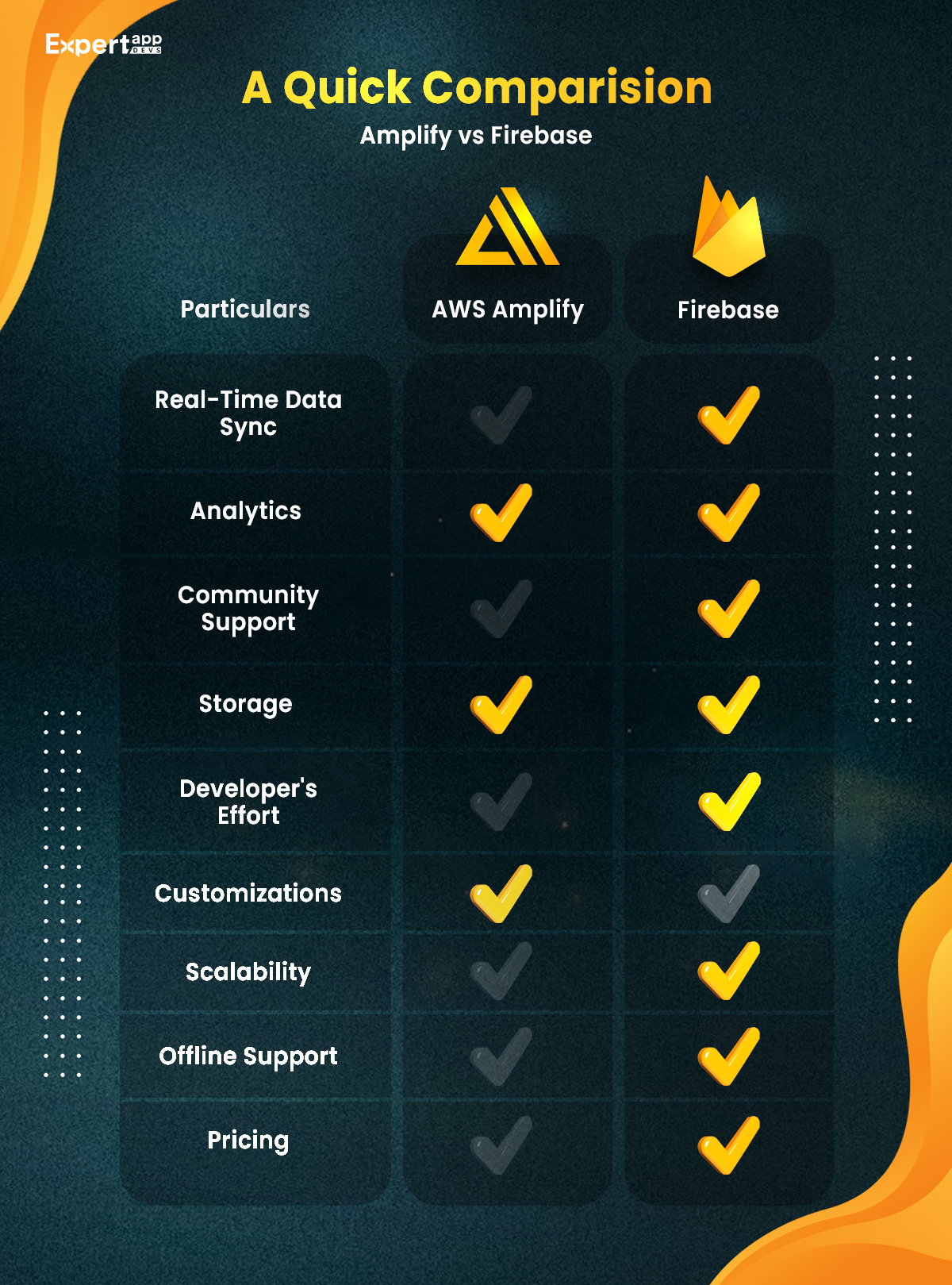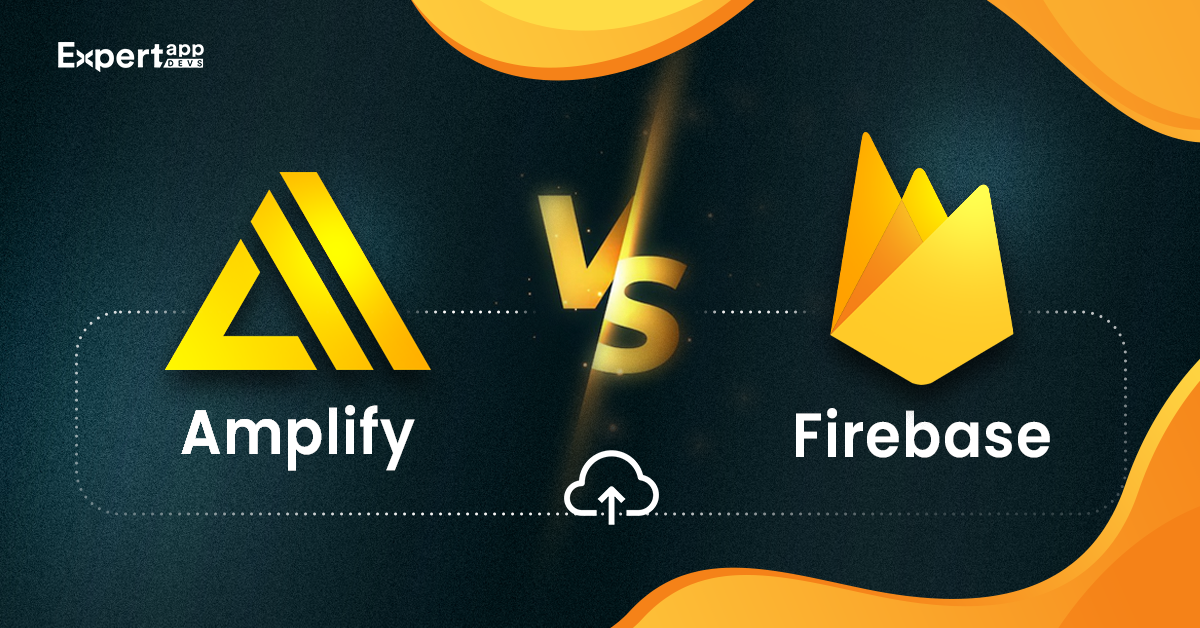Amplify vs Firebase: Which Is Best Suited for Your App Project?
Businesses are constantly pivoting to increase their customer base and improve their visibility in the target market. Applications are an integral part of this expansion. It can help them reach a maximum number of users, as many people use smartphones regularly.
When developing the application, the biggest concern is the tech stack. The choicest tech stack can help you plan an efficient solution and enhance the developer's productivity. Several businesses are considering full-stack development.
For the unversed, full-stack development is an all-inclusive development environment where the developers can construct the front and backend solutions. It comes with the essential tools, frameworks and libraries to accelerate development.
As a business, one of the main reasons to consider full-stack is its consistency and time-saving. The wide range of libraries makes development efficient. The developers can easily collaborate to deliver a streamlined and defined app solution.
It is important to choose the apt full-stack environment for your upcoming solution. The suitable framework can deliver your solution's much-needed integration capabilities and flexibility. Developers have ranked AWS Amplify and Firebase at the top.
We will compare these two environments against several factors to decide which one works best for app development.
What is Amplify?

AWS Amplify is a complete full-stack development environment that helps businesses create, host and deploy full-stack apps on AWS. You can increase development agility and enhance the quality of your solutions with this platform. You can build the product with greater speed and quality due to the numerous in-built tools, frameworks and services.
The Key Features of AWS Amplify
1. It comes with a serverless backend that allows developers to manage file storage, database management, API handling and other aspects of server management.
2. You can use various authentication approaches with Amplify. This includes logging in with your social media handles, SSO methods and signing up with a unique ID and password.
3. It easily integrates with several AWS services, including DyanmoDB, API Gateway and Aurora Serverless. As a result, you can induce real-time data sync with this tool.
4. There are numerous frontend libraries that you can access with this development framework. It makes building the interface easy and agile.
5. It offers extensive hosting support to the developers, thus ensuring better access to your documents and files.
6. It extends support towards GraphQL, which is important for API handling and data manipulation.
Pros and Cons
|
Pros |
Cons |
|
It integrates with a number of AWS services, including payment gateways. As a result, you can extend the abilities of the software. |
It has a steep learning curve. |
|
Data-backed insights from the in-built analytics and data monitoring solutions. |
You will face a vendor lock-in. Moving away from Amazon may seem slightly difficult. |
|
It has a serverless architecture, thus ensuring minimal scaling or maintenance issues. |
There is limited control over the systems and infrastructure. |
|
Extends simplified development environment for greater agility |
You will find limited customization capabilities in this environment. |
Different Faces of AWS Amplify
1. Amplify Studio: Amplify Studio manages full-stack development's backend and user authentication aspects. It is also used for content management and importing AWS resources into your application.
2. Amplify CLI: You can build and maintain your app backend using the local desktop with the Amplify CLI. With this tool, you can build interactive workflows and deliver to the cloud functionality.
3. Amplify Libraries: You can use the libraries to deliver capable mobile and web applications using cloud management solutions.
4. Amplify UI Components: This is the UI toolkit that can help deliver a capable and interactive front-end solution for your business application.
What is Firebase?

Firebase is a cloud-computing platform that helps developers build solid backend solutions. It was created by Google. The platform offers robust SDKs for cross-platform development and enhances the deliveries. You can use it to ship applications with iOS, C++ and Unity.
The platform supports developers across the app development lifecycle with a wide range of tools and libraries. It helps improve development and boost user engagement for positive conversions. As Google backs it, you can expect regular updates and immediate resolution to customer issues.
The Key Features of Firebase
1. It has a NoSQL database, ensuring real-time data sync and updates. As a result, you can use this to build real-time and robust applications.
2. As it is a cloud-based platform, you can access numerous server-side coding features over the cloud services. It accelerates the HTTP requests and simplifies task development.
3. Numerous libraries and tools make app development simple and streamlined for users.
4. With the crash reporting feature, you can detect app crashes immediately, thus ensuring a more stable application.
5. Firestore database is a cloud-based solution that offers extensive scalability. It helps handle complex querying requirements.
Pros and Cons of Firebase
|
Pros |
Cons |
|
Offers real-time database capabilities for quick querying and responses |
This full-stack platform offers offline capabilities. However, it is not fully developed as regular database management platforms. |
|
It is a beginner-friendly platform with a low learning curve |
There are only specific customizations available for the developer |
|
Flexibility in authentication as it offers numerous authentication methods |
The usage and user base determine the pricing of the platform. As a result, it can become expensive if you don't keep note of your services. |
|
It is a highly scalable platform. |
Not the best choice for complex queries or large-scale data |
|
It ensures quick crash reporting and handling and offers a stable application. |
AWS Amplify vs Firebase- The Right Choice for Your Project

1. Real-time data sync
Amplify: It supports real-time data synchronization like most full-stack cloud solutions. However, it uses components like AWS AppSync to support the sync. At the same time, you may need external support and additional solutions to enhance real-time data sync.
Firebase: It extends native support for real-time data sync. There is no need for external support or solutions.
The Better One: As Firebase natively supports real-time data sync, you must choose Firebase for real-time cloud-based applications. It is clear that Firebase wins in the battle between Firebase vs Amplify.
2. Analytics
Amplify: Amplify offers analytics solutions using the Amazon Pinpoint application. You can create custom features and triggers to track using this analytics solution. It integrates with other AWS solutions.
Firebase: You can directly Firebase with Google Analytics. It offers a more out-of-the-box solution to meet your analytics requirements. It can be easily integrated with your web or mobile application. It also enhances real-time reporting.
The Better One: If you want an out-of-the-box solution with real-time reporting, you must choose Firebase. You can select Amplify if you wish for more custom and complex event triggers.
3. Community Support
Amplify: The platform houses a solid community. However, the community support is not too extensive or enriching.
Firebase: Firebase is a platform backed by Google Cloud Platform. As a result, you will find more people backing the platform.
The Better One: If you want a strong community and documentation that can help you build robust applications, you must go with Firebase.
4. Storage
Amplify: When you use Amplify, your data is stored on the S3 storage. This means you are completely locked into the AWS environment for your application.
Firebase: This one stores the data on Google Cloud. You may have a better chance if you want to migrate from Google Cloud to others.
The Better One: If you are completely locked into AWS, you can choose Amplify. However, if you plan to choose a full-stack development platform for the first-ever app, go with Firebase. This way, you would still be on Google.
5. Developer's Effort
Amplify: If you have used the AWS platform earlier, you will find AWS Amplify an easy and developer-friendly platform. It uses tools like CLI and web console to streamline the development. Developers can easily build multi-platform solutions with Amplify Flutter and AWS Amplify React Native frameworks.
Firebase: It has been determined as a beginner-friendly platform. Even if you are using the platform for the first time, it will remain easy and usable.
Moreover, you can use cross-platform frameworks using firebase. For instance, Firebase Flutter and React Native Firebase can help build native-like multi-platform applications.
The Better One: If you aren't linked to other AWS platforms, the better choice would be to go with Firebase. You can easily use it to deliver applications.
6. Customizations
Amplify: Amplify is one of the few platforms offering extensive customisations regarding the developer's platform and analytics. You can create custom applications with this platform.
Firebase: It is an off-the-shelf platform that limits customization opportunities. The opinion and rigidity of the platform would bind you.
The Better One: If you want to incorporate customizations, you must choose Amplify, as it is more flexible and customizable,
7. Scalability
Amplify: This platform offers a pay-as-you-use framework. As a result, you can easily scale your applications.
Firebase: It comes with NoSQL databases, so you can easily scale the applications with this platform.
The Better One: Firebase is a better platform as it offers database scalability and flexibility.
8. Offline Support
Amplify: If you want to handle offline capabilities with AWS Amplify, you must configure solutions like AWS AppSync and AWS Amplify DataSTore.
Firebase: You get out-of-the-box support for offline capabilities with this framework.
The Better One: Firebase is a better solution to extend your app's offline capabilities and enhance the application.
9. Pricing
AWS Amplify: It comes with a free tier that expires in one year. You get close to 1000 minutes of build in a single month. The storage capacity is 5GB. You get about 15GB of data transfer capacity.
Firebase: Firebase comes with a free tier and no limitations. you get more storage capacity.
The Better One: Google Firebase is definitely better in terms of pricing and capabilities. Its free version offers extensive abilities to the developer. It cuts down on development costs extensively.
Conclusion
In the debate between Google Firebase and AWS Amplify, Firebase has been showcasing extensive capabilities. it is a more scalable, flexible and enriching platform. The offline capabilities are also exceptional and offer better data-build abilities.
However, when it comes to customizations, AWS Amplify is better as it offers the exact tools and support.
Expert App Devs have the right team, tools and infrastructure for application development using AWS Amplify and Firebase. We have the expert resources to enable the best solutions. If you want to develop using either one of these platforms, you can connect with our team.
 Jignen Pandya
Jignen Pandya




